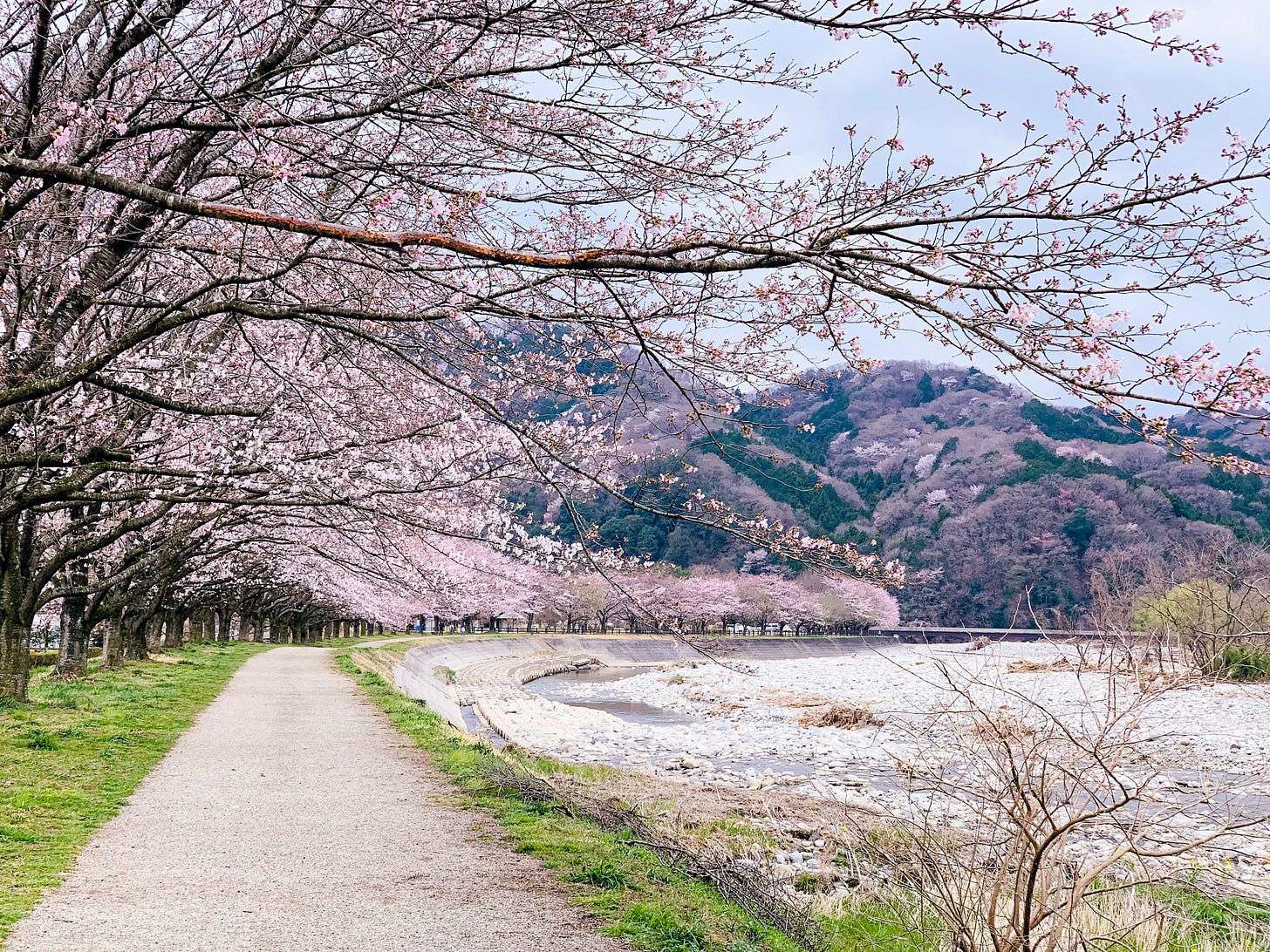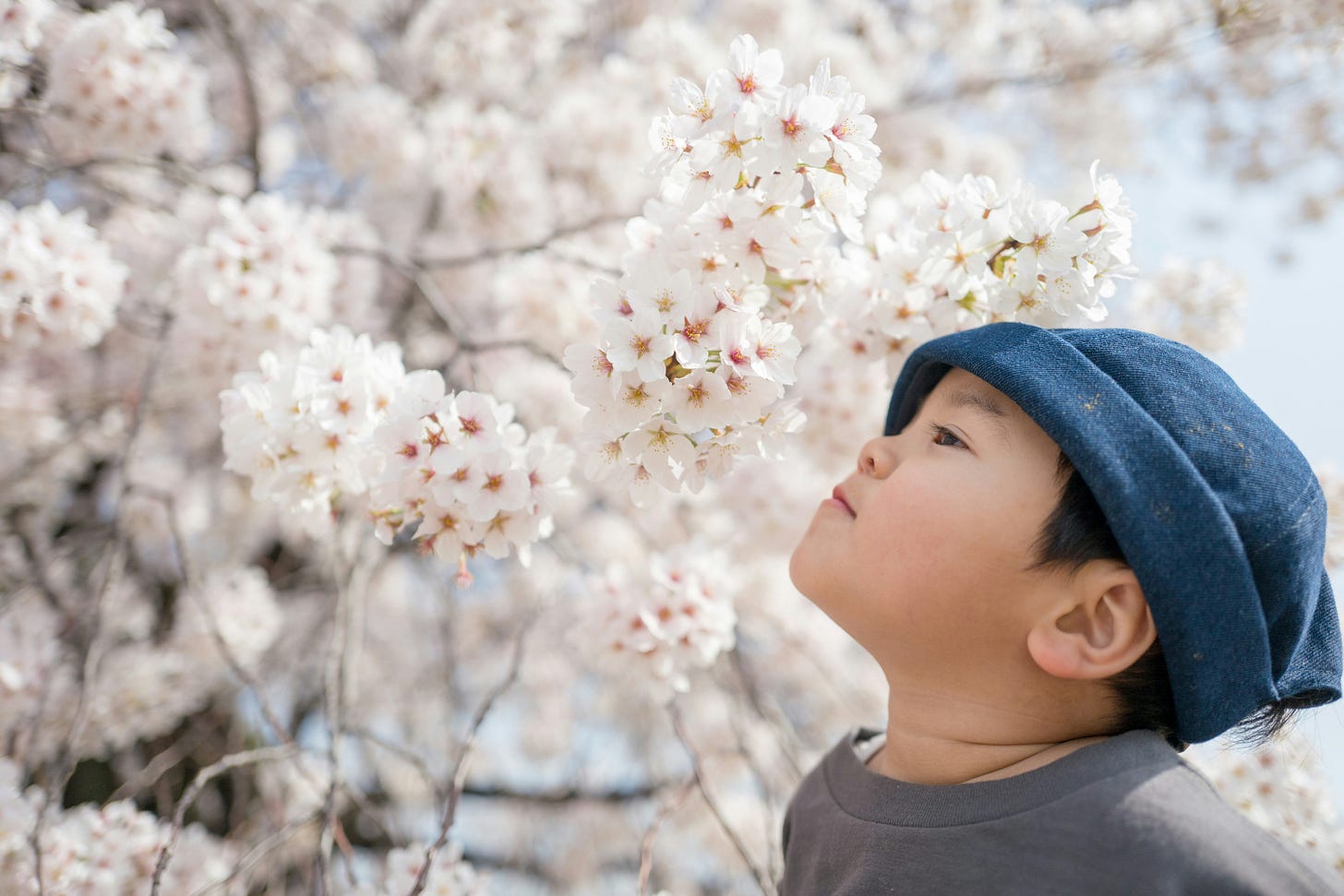Sakura: Folk Song... and Hymn? (feat. Yurika Dedachi)
A recording of a Christian hymn set to a traditional Japanese tune
I recently discovered a hymn entitled ‘Praise the Lord’ written by Nobuaki Hanaoka, and which had been set to the melody of the traditional Japanese folk song ‘Sakura’ – how cool is that!1 (And apt since it’s currently sakura season.)
I decided to record it with the help of my friend, Yurika Dedachi.2 We start with a verse of the original folk song in Japanese, followed by the three English verses. Do have a listen, then scroll down for commentary:
‘Sakura’ originated in the Edo period and is ubiquitous to anyone who grew up in Japan.3 It utilises the in scale (pentatonic scale), and is often touted as the song that best represents Japanese music – which is why it’s no surprise that its widely familiar tune was chosen for this Christian hymn version.4
The first thing I wondered was: who was this hymn meant for? A little research shows that it was written in 1980 by Nobuaki Hanaoka, a Japanese who survived the 1945 Nagasaki bombing as an infant, studied at a seminary in Japan and moved to the US where he became a United Methodist minister for 35 years in California. He was also appointed to the committee for the Asian American hymnal, Hymns From the Four Winds (1983), which contains this hymn. He’s currently retired and (I believe) is still in the US.
Two points of reflection: one, I can imagine this hymn being super empowering for Japanese heritage people in the West. The nostalgic association with a bygone past – we all sang it as kids in Japan – makes it really poignant, allowing them to retain a grasp of their heritage in a western context, whilst also acknowledging the linguistic and cultural shift they’ve undergone.
But whilst I can understand how it could be empowering for a western-born/raised person (e.g. Japanese Americans), I wondered what it would be like for a Japan-born/raised person like Yurika. After she recorded the video, I asked her: what did she think of the hymn? How was her experience of singing it?
Although she grew up in an international church where she sang hymns and worship songs in both English and Japanese, singing this particular hymn felt a bit off.5 In her own words:
As I played and sung this Christian version of ‘Sakura’, I felt a strange uncomfortableness, an 違和感 [iwakan], as if something was off. It’s hard to describe it in words, but it felt as if I was betraying my own traditions, culture, language, and perhaps my own identity.
Yurika also suspects other Japanese Christians might not be so keen on these kinds of translations, and Japanese culture being shared in this manner.6 But she also reflects that that iwakan might stem from a pride in one’s Japanese identity – above and beyond one’s identity in Christ – and she recognises the potential hindrance it could be to sharing in the global church.
As a Christian in Japan, or a Japanese Christian, I am coming to realise that accepting and welcoming Jesus into our lives, our society, our communities requires us to also open up and be transformed ourselves.

My other point of reflection: two, this hymn could be, not just empowering for westernised Japanese people, but also an example of an accessible Japanese contribution to the western church.7
Interestingly, Hanaoka has also written a book called On the Back of a Buffalo: Eastern Stories for Western Journey, which contains 34 spiritual stories from Japan, China and India, accompanied by his own Christian reflections on how they might enrich the spiritual lives of those in the contemporary western world. It perhaps reveals a bit of Hanaoka’s aim in writing the hymn: to allow his cultural background and heritage to contribute something meaningful to the western church, instead of being dismissed wholesale. (This, too, is my heart!)8
Just like how much of what Yurika sang growing up in church were Japanese translations of English hymns and worship songs, I find there’s something quite beautiful about it going the other way – where people might sing English translations of Japanese songs that enrich the worship lives of people in the western church.
If you Google the Japanese theologian, Masao Takenaka, you’ll stumble upon a PDF scan of his 1985 lecture notes (which served as the basis for his book, God is Rice) – which is where I found this hymn as a page taken from a 1983 Asian American hymnal.
Yurika is the daughter of a Japanese pastor, and is currently studying for an MA in Intercultural Theology, with a focus on the interaction between Shinto and Christianity.
First verse of ‘Sakura’:
さくら さくら
sakura sakura
のやま も さと も
noyama mo sato mo
みわたす かぎり
miwatasu kagiri
かすみ か くも か
kasumi ka kumo ka
あさひ に におう
asahi ni niou
さくら さくら
sakura sakura
はな ざかり
hana zakari
English Translation:
Cherry blossoms, cherry blossoms,
In fields, mountains and villages
As far as the eye can see.
Is it mist, or clouds?
Fragrant in the rising sun.
Cherry blossoms, cherry blossoms,
Flowers in full bloom.
'Praise the Lord (SAKURA)’ written by Nobuaki Hanaoka (1980):
Verse 1:
Praise the Lord, Praise the Lord,
For the greenness of the trees,
For the beauty of the flow’rs,
For the blueness of the sky,
For the greatness of the sea;
Praise the Lord, Praise the Lord,
Now and forever.Verse 2:
Thanks to God, Thanks to God,
For the gift of friends in Christ,
For the church, our house of faith,
For the gift of wondrous love,
For the gift of endless grace,
Thanks to God, Thanks to God,
Now and forever.Verse 3:
Glory to God, Glory to God,
For the grace of Christ, the Son,
For the love of parent God,
For the comfort and the strength
Of the Spirit, Holy God;
Glory to God, Glory to God,
Now and forever.
It’s worth noting that Yurika did compliment the translation, as it includes elements of colour and nature that’s often used in haiku, as well as having a sombre spiritual tone that’s absent in recent Japanese worship songs.
I wonder if that’s because it wouldn’t necessarily be deemed ‘pure’ or authentic. Although Japanese people are masters at adopting and adapting from other cultures, there’s often a strong insistence on retaining authenticity when it goes the other way.
The worry is that even though ‘Sakura’ might empower/enrich people, it could also become tokenised. But Yurika pointed out that it’s already tokenised in and outside of Japan as representative of Japanese music (similar to Auld Lang Syne is in the West) – and perhaps that accessibility and familiarity is not so bad a thing.
Yes, I want to learn more about East Asian theologies in an East Asian context; but I also want those East Asian theologies to benefit and enrich the West. My MA dissertation was exploring what the western church can learn from East Asian theologies, particularly an openness to the spirit world.




